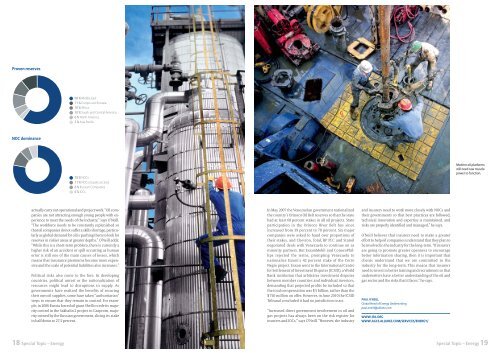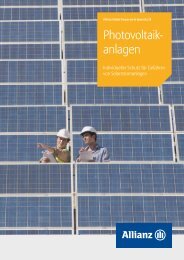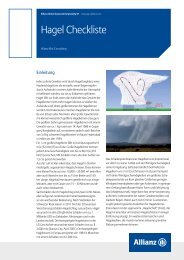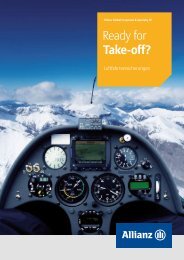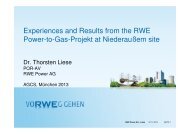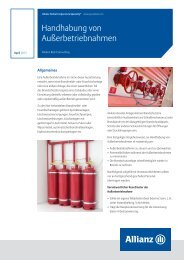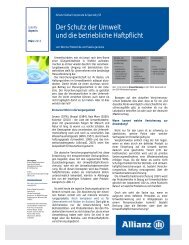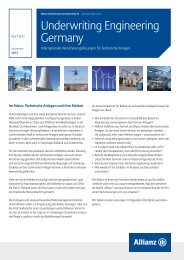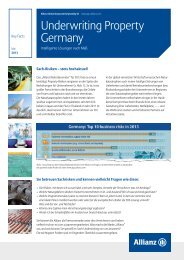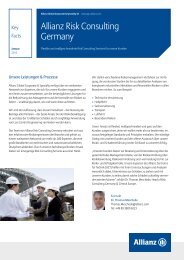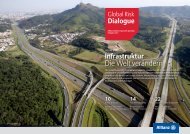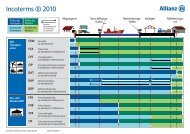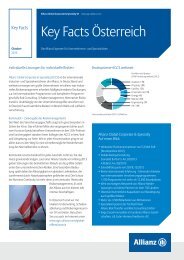Energy - Allianz Global Corporate & Specialty
Energy - Allianz Global Corporate & Specialty
Energy - Allianz Global Corporate & Specialty
Create successful ePaper yourself
Turn your PDF publications into a flip-book with our unique Google optimized e-Paper software.
Proven reserves<br />
NOC dominance<br />
60 % Middle East<br />
11 % Europe and Eurasia<br />
10 % Africa<br />
10 % South and Central America<br />
6 % North America<br />
3 % Asia Pacific<br />
78 % NOCs<br />
11 % NOCs (equity access)<br />
6 % Russian Companies<br />
6 % IOCs<br />
actually carry out operational and project work. “Oil companies<br />
are not attracting enough young people with experience<br />
to meet the needs of the industry,” says O’Neill.<br />
“The workforce needs to be constantly replen ished so<br />
that oil companies do not suffer a skills short age, particularly<br />
as global demand for oil is pushing them to look for<br />
reserves in riskier areas at greater depths.” O’Neill adds:<br />
“While this is a short-term problem, there is currently a<br />
higher risk of an accident or spill occurring as human<br />
error is still one of the main causes of losses, which<br />
means that insurance premiums become more expensive<br />
and the scale of potential liabilities also increases.”<br />
Political risks also come to the fore. In developing<br />
countries, political unrest or the nationalization of<br />
resources might lead to disruptions in supply. As<br />
governments have realized the benefits of securing<br />
their own oil supplies, some have taken “authoritarian”<br />
steps to ensure that they remain in control. For example,<br />
in 2006 Russia forced oil giant Shell to cede its majority<br />
control in the Sakhalin 2 project to Gazprom, majority-owned<br />
by the Russian government, slicing its stake<br />
in half down to 27,5 percent.<br />
In May 2007 the Venezuelan government nationalized<br />
the country’s Orinoco Oil Belt reserves so that the state<br />
had at least 60 percent stakes in all oil projects. State<br />
participation in the Orinoco River Belt has since<br />
increased from 39 percent to 78 percent. Six major<br />
companies were asked to hand over proportions of<br />
their stakes, and Chevron, Total, BP PLC and Statoil<br />
negotiated deals with Venezuela to continue on as<br />
minority partners. But ExxonMobil and ConocoPhillips<br />
rejected the terms, prompting Venezuela to<br />
nationalize Exxon’s 42 percent stake of the Cerro<br />
Negro project. Exxon went to the International Centre<br />
for Settlement of Investment Disputes (ICSID), a World<br />
Bank institution that arbitrates investment disputes<br />
between member countries and individual investors,<br />
demanding that projected profits be included so that<br />
the total compensation was $ 5 billion, rather than the<br />
$ 750 million on offer. However, in June 2010 the ICSID<br />
Tribunal concluded it had no jurisdiction to act.<br />
“Increased direct government involvement in oil and<br />
gas projects has always been on the risk register for<br />
insurers and IOCs,” says O’Neill. “However, the industry<br />
and insurers need to work more closely with NOCs and<br />
their governments so that best practices are followed,<br />
technical innovation and expertise is maintained, and<br />
risks are properly identified and managed,” he says.<br />
O’Neill believes that insurers need to make a greater<br />
effort to help oil companies understand that they plan to<br />
be involved in the industry for the long-term. “If insurers<br />
are going to promote greater openness to encourage<br />
better information sharing, then it is important that<br />
clients understand that we are committed to the<br />
industry for the long-term. This means that insurers<br />
need to invest in better training and recruitment so that<br />
underwriters have a better understanding of the oil and<br />
gas sector and the risks that it faces,” he says.<br />
PAUL O'NEILL<br />
<strong>Global</strong> Head of <strong>Energy</strong> Underwriting<br />
paul.oneill@allianz.com<br />
WWW.IEA.ORG<br />
WWW.AGCS.ALLIANZ.COM/SERVICES/ENERGY/<br />
Modern oil platforms<br />
still need raw muscle<br />
power to function.<br />
18 Special Topic – <strong>Energy</strong> Special Topic – <strong>Energy</strong> 19


